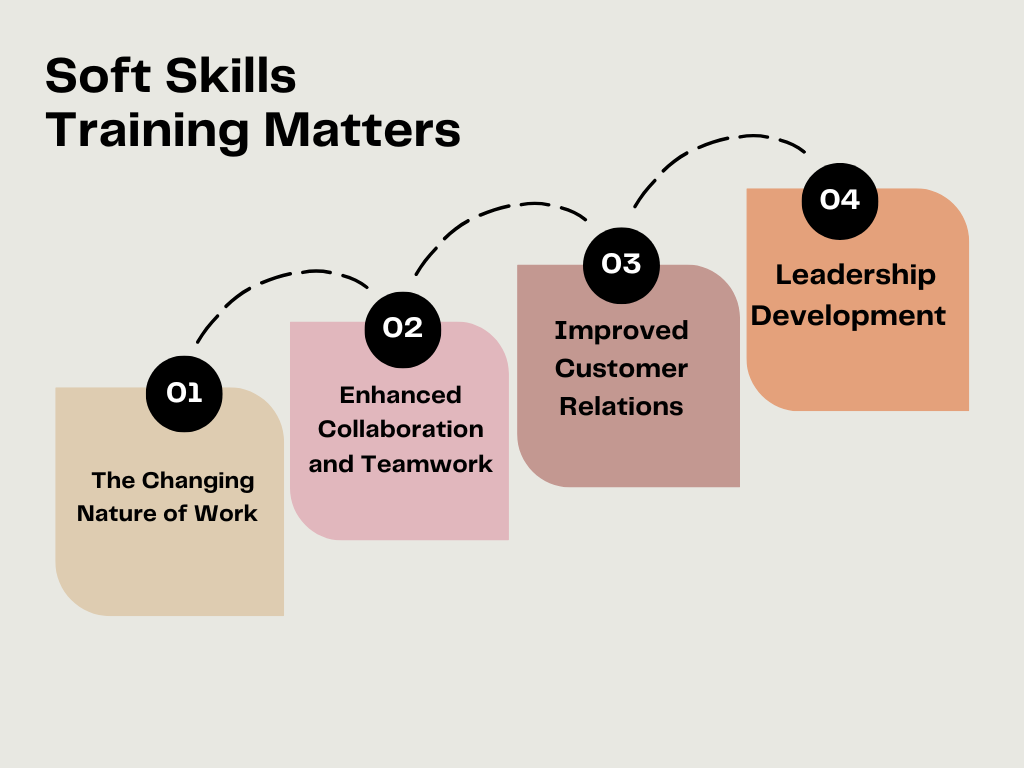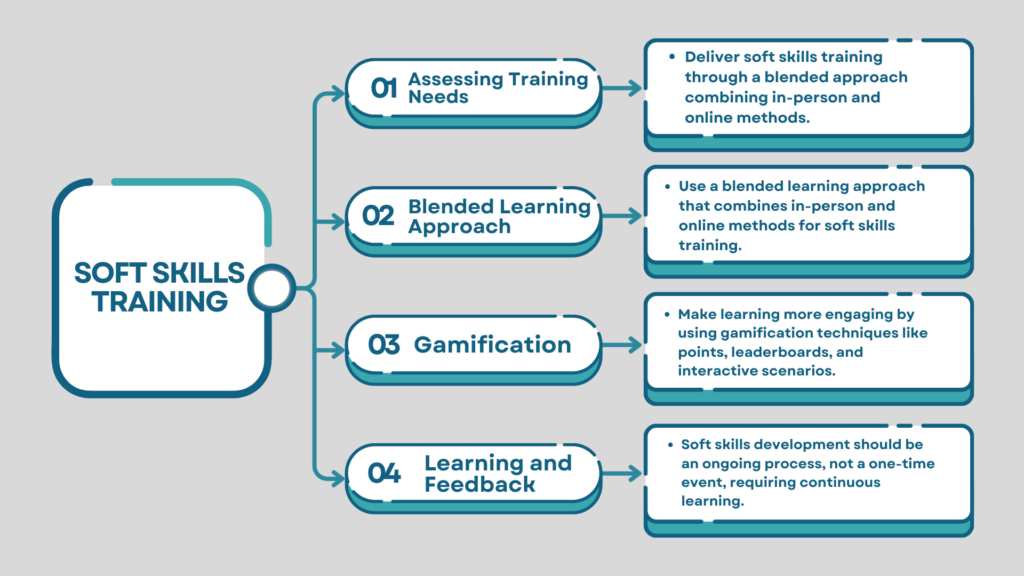In today’s fast-changing business world, you might wonder: is technical expertise still enough to succeed at work? For a long time, hard skills like job-specific knowledge and certifications were seen as the ultimate keys to professional growth. But recently, something more powerful has been reshaping careers and companies alike—the Rise of Soft Skills.
If you’re part of a Learning & Development (L&D) team, a business leader, or simply looking to future-proof your career, it’s crucial to understand why soft skills like communication, emotional intelligence, adaptability, and collaboration have become non-negotiable. Businesses today aren’t just hiring for qualifications; they are looking for people who can work well with others, think critically, and adapt quickly to change.
In this article, you’ll discover why soft skills training is becoming a must-have in corporate L&D programs, how companies are successfully integrating it, and what strategies you can use to implement soft skills development in your own teams. Whether you’re building an L&D program from scratch or updating your training strategy, understanding the rise of soft skills could be the game-changer you need.
Why Soft Skills Training Matters in Today's Corporate Environment
The rise of soft skills isn’t just a passing trend—it’s a fundamental shift in how organizations approach employee development. Here’s why soft skills have gained such importance:

1. The Changing Nature of Work
The corporate world is undergoing rapid changes with technology playing a central role in everyday business operations. While automation and artificial intelligence (AI) take over more technical tasks, the ability to collaborate, communicate, and adapt remains uniquely human. Soft skills such as critical thinking, problem-solving, and creativity have become essential for employees to complement technical skills.
2. Enhanced Collaboration and Teamwork
In today’s business environment, team collaboration is a key factor in driving innovation and achieving organizational goals. The ability to work in diverse teams and effectively communicate ideas is critical. Soft skills training fosters the development of interpersonal skills and helps teams function more harmoniously, even when remote or dispersed across various locations.
3. Improved Customer Relations
Customer experience has become the battleground for businesses. Employees with strong communication and emotional intelligence can better understand and respond to customer needs, ensuring long-term loyalty and satisfaction. Soft skills are crucial for employees working in client-facing roles to handle customer queries, complaints, and requests with empathy and professionalism.
4. The Rise of Remote Work
With the rapid growth of remote work, effective communication has become even more essential. Teams working from different geographical locations need strong interpersonal skills to maintain engagement and productivity. Training employees to manage time, work independently, and collaborate effectively in virtual environments is more important than ever.
Key Soft Skills that Matter in Corporate L&D
As organizations increasingly recognize the rise of soft skills, certain skills are consistently highlighted as critical for employee success. Here are some of the top soft skills that corporate L&D programs are focusing on:
1. Communication
Communication is at the core of nearly every aspect of business. It encompasses verbal, written, and non-verbal skills and is crucial for successful collaboration and leadership. Employees who communicate effectively help ensure that everyone is aligned and that information flows seamlessly through the organization.
2. Emotional Intelligence (EI)
Emotional intelligence involves the ability to recognize, understand, and manage one’s emotions, as well as the emotions of others. EI is vital for leadership, conflict resolution, and customer interaction. Leaders with high emotional intelligence foster trust and create a supportive work environment that promotes collaboration and well-being.
3. Adaptability and Resilience
The ability to adapt to change and bounce back from setbacks is essential in today’s business world, where disruption is a constant. Adaptability helps employees embrace new technologies, work processes, and organizational changes, while resilience helps them handle pressure and stress.
4. Collaboration and Teamwork
Working well with others is fundamental to any organizational success. The rise of cross-functional teams has highlighted the need for employees to collaborate effectively across different departments and cultures. Teamwork is also essential in remote and hybrid working models where coordination and trust-building are key.
5. Critical Thinking and Problem-Solving
Employees who can analyze situations, identify challenges, and come up with effective solutions are an asset to any organization. Critical thinking and problem-solving skills empower employees to make better decisions, innovate, and overcome obstacles efficiently.
Implementing Soft Skills Training in Corporate L&D Programs

The Impact of Soft Skills Training on Organizational Success
The rise of soft skills in corporate L&D programs is not just a trend—it’s a necessity for long-term success. Here’s how investing in soft skills training positively impacts organizations:
1. Increased Employee Engagement
Employees who feel supported and equipped with the tools they need to succeed are more likely to be engaged in their roles. Soft skills training provides employees with the confidence to communicate effectively, collaborate, and handle stress, leading to higher job satisfaction and retention rates.
2. Stronger Organizational Culture
Companies that prioritize soft skills foster a positive organizational culture where respect, empathy, and collaboration thrive. A culture rooted in strong interpersonal skills helps build trust, reduces conflicts, and promotes employee well-being.
3. Improved Business Outcomes
The link between soft skills and business outcomes is undeniable. Organizations that invest in developing communication, problem-solving, and leadership skills are better equipped to meet customer needs, manage change, and drive innovation. This leads to improved customer satisfaction, higher productivity, and a better competitive edge in the market.
FAQ: Rise of Soft Skills Training in Corporate L&D Programs
The rise of soft skills is important because these skills enhance collaboration, communication, leadership, and adaptability—essential qualities for success in today’s rapidly changing work environment. Organizations that invest in soft skills training see improved employee engagement, productivity, and innovation.
The most important soft skills in corporate training include communication, emotional intelligence, adaptability, problem-solving, and teamwork. These skills help employees navigate challenges, work collaboratively, and build strong relationships within the workplace.
Organizations can implement soft skills training through blended learning approaches, gamification, leadership-led training programs, and continuous feedback. It’s important to assess training needs, create tailored programs, and promote an ongoing learning culture.
Soft skills training leads to increased employee engagement, a stronger organizational culture, and improved business outcomes. It helps employees develop crucial interpersonal skills, which enhances teamwork, leadership, and customer satisfaction.
Yes, soft skills training is highly suitable for remote teams. In fact, it is even more important for virtual work environments where communication, adaptability, and collaboration play a significant role in team success. Online courses, virtual workshops, and coaching can help remote teams develop essential soft skills.














